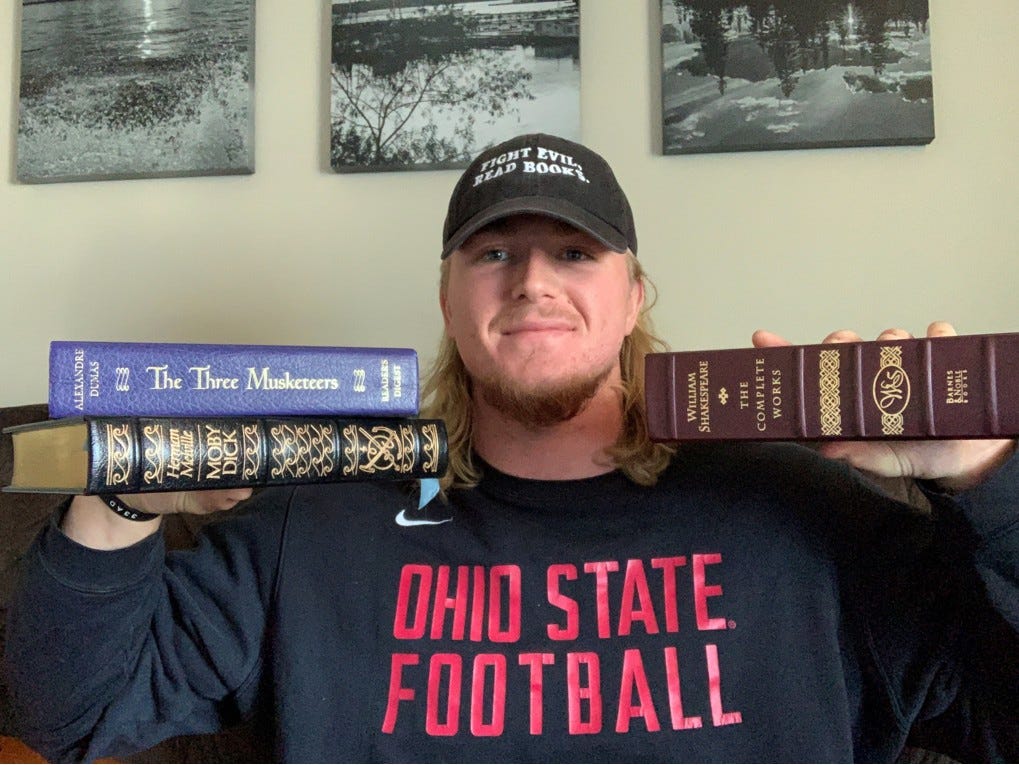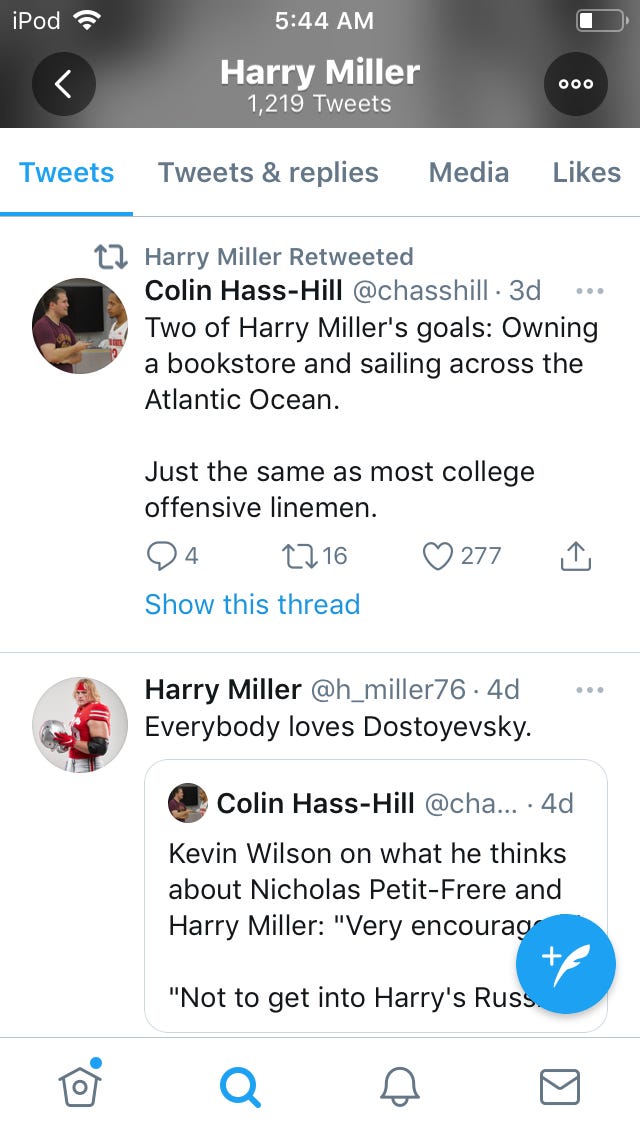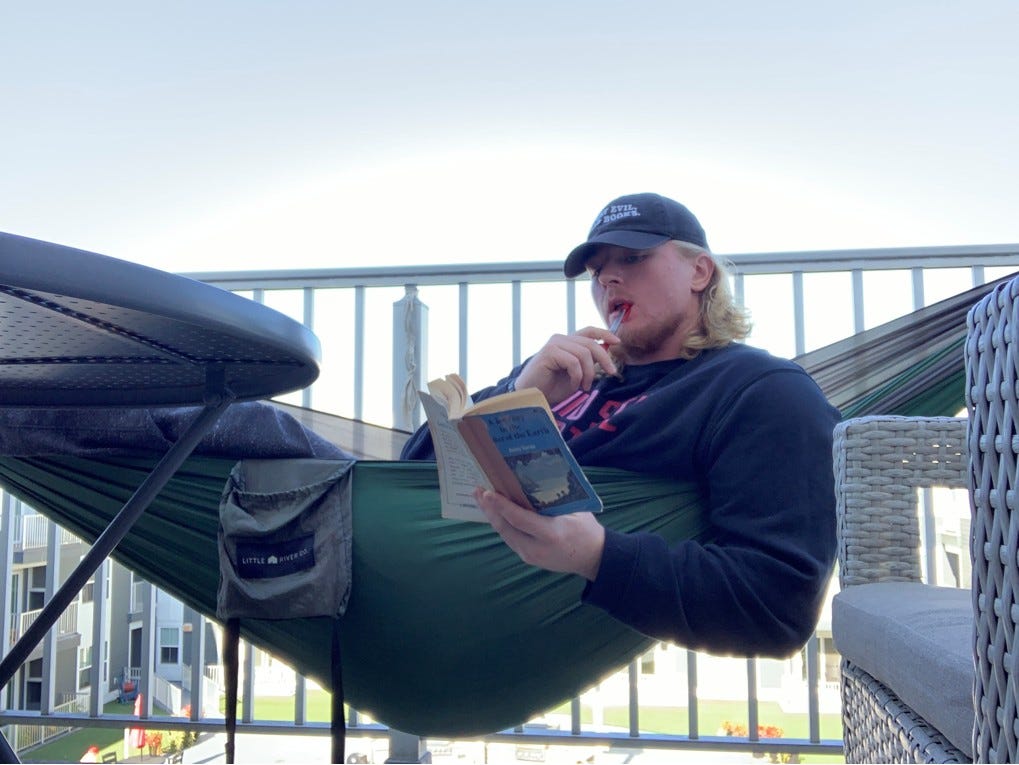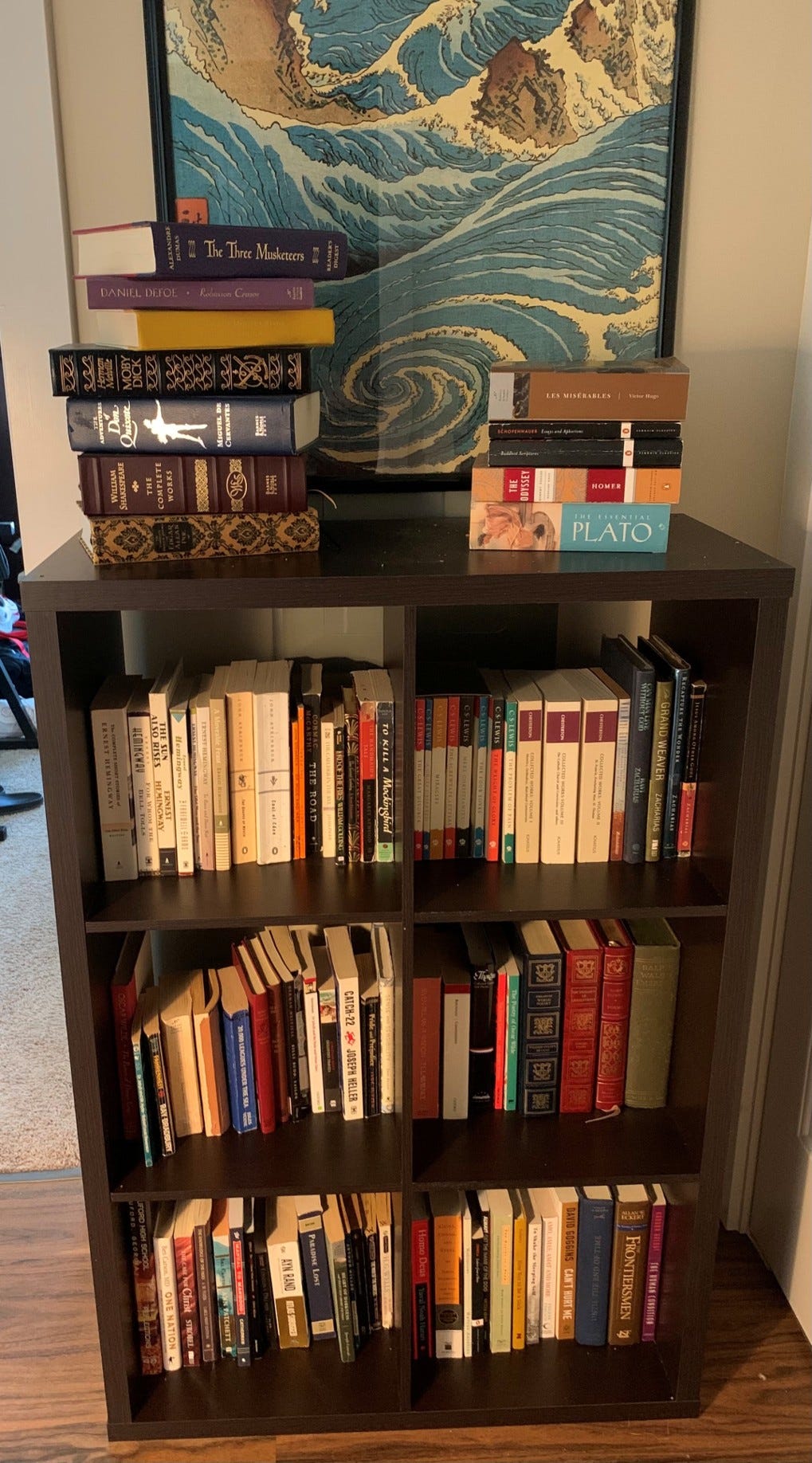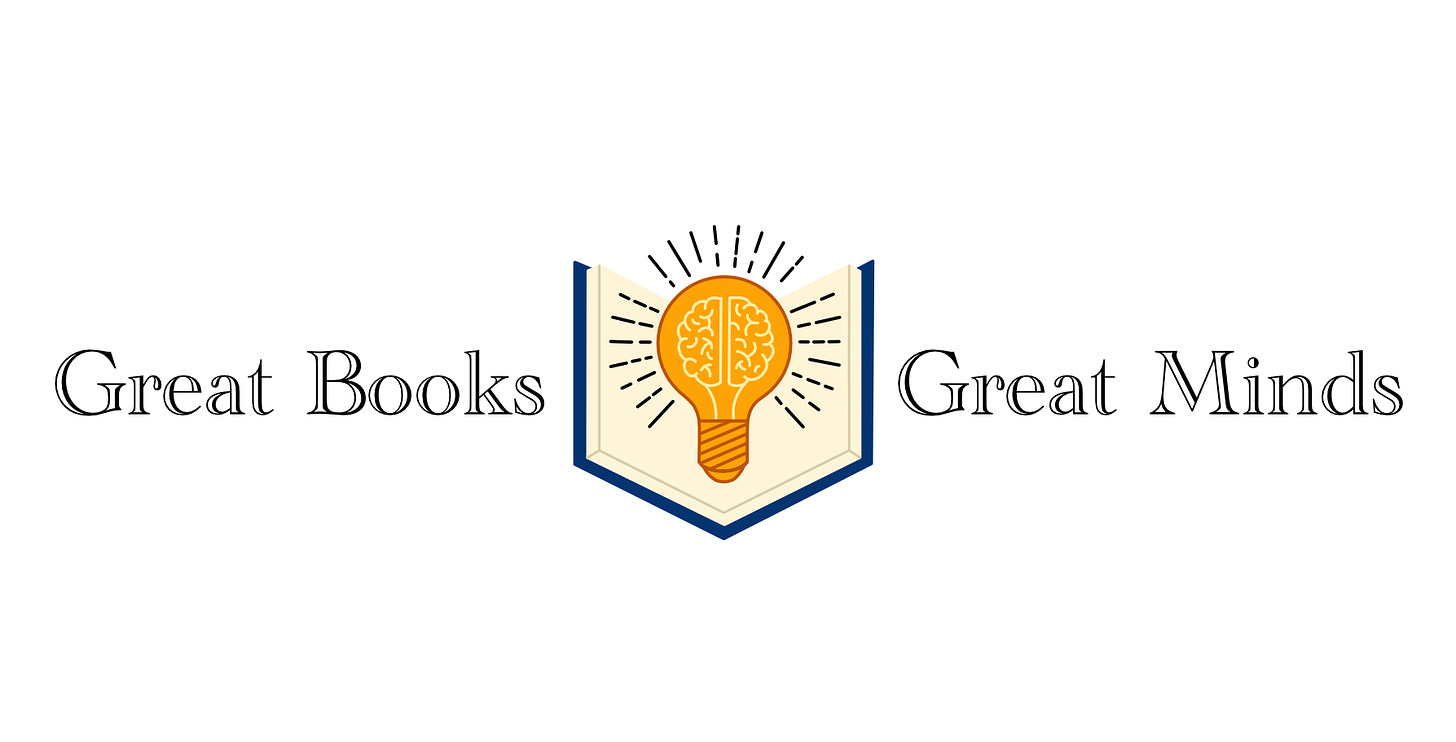Buckeye Football Player Harry Miller and His Insatiable Thirst For The Bibliophilic Life
As a scholar-athlete and starting offensive guard for The Ohio State University, Harry Miller always has a book nearby. His bibliophilic ways recently garnered a flurry of media attention on Twitter where it was revealed:
Great Books, Great Minds reached out to Harry Miller last week (via Twitter) and was stunned at his rapid response given his rigorous academic and football schedule (He is reportedly an honor student in Mechanical Engineering). Here is what he had to share:
Please share with us a little about you and your journey into the world of books and reading?
My appreciation for literature began in the latter half of high school. I always read what I was told to read: “To Kill A Mockingbird” during my freshman year and “Things Fall Apart” as a sophomore year. However, as I began to become more inquisitive and more self- wondering as a product of coming-of-age, I was met by Henry David Thoreau, guided by T.S. Eliot, and welcomed by Shakespeare at a time when I could truly appreciate and understand it.
Were there any teachers or mentors that guided you on this quest?
My literature teachers, Mr. Gillis, Ms. Beach, Mrs. Lister, and Dr. Harris did not offer me answers. Rather, they offered me questions. To read the poetry and writings of such great thinkers felt like drinking and eating the most important substance the world had to offer. And naturally, as most avid readers know, the more one drinks from the cup or world literature, the thirstier one gets. For me, it seems like there is always one more book to read.
How has your life as a scholar-athlete informed your reading interests?
Although being a student-athlete is a major portion of my life, I often use books to evade daily living. Football meetings can grow weary, but Steinbeck’s “Salinas Valley” never does. Calculus homework is rather cumbersome, but Hemingway’s “Italy” never is. I often find myself deeply enchanted with such stories and can’t help but share it with my teammates and coaches.
Are there any teammates of yours that share a similar reading passion?
Finishing a book feels like coming back from a long journey, and who can stop themselves from telling their friends about it? As a result, I would say that I have become closest to coach Niko Palazeti, along with teammates Max Wray, Luke Farrell, Danny Vanatsky, and Tommy Eichenberg through the vehicle of reading and conversation.
What book or books have had the greatest impact on your life?
“Moby Dick,” by Melville, is my favorite book. Its themes of fate and obsession, along with the determined war that Ahab wages against Nature and the will of God resonate, I think, in all human action. Another book I love is “The Three Musketeers,” by Dumas. To me, there is no group of people more charming than Athos, Porthos, Aramis, and D’Artagnan, and no novel with better statements on honor, adventure, and friendship.
Are there any others?
Yes, I would like to add “The Grapes of Wrath,” by Steinbeck. It is one of the best books in terms of illustrating the austere love of men and the resilient love of women. The Joad family is truly remarkable and Tom Joad is perhaps one of the noblest men in literature. All these novels have given me traits to aspire to and traits to avoid, not to mention the hope to one day be as witty and insightful as the men who wrote their contents.
You have publicly stated that one of your dreams is to someday own a bookstore. Can you offer a bit more on this interest of yours?
I would love to own a bookstore. I am so often saddened to see how fast we live our lives without stopping to read, let alone converse, let alone think, even! I want to reinvigorate an appreciation for things slow and things broken: records that are scratched but play the same beautiful music, books that are creased, but still offer the same beautiful stories, and people who are far from perfect, but who are beautiful for that very reason.
That’s quite a noble view.
I hope to always keep in mind the somber Soren Kierkegaard quote, “Many of us pursue pleasure with such breathless haste that we hurry past it,” along with the quote by Rabindranath Tagore, “It is very simple to be happy, but it is very difficult to be simple.” All of the complications we have in life are often of our own doing, and I think many of them can be reduced to nothing if we just found a good chair, a good cup of coffee, and a good book. Hopefully, my bookstore could be simply that: simply simple.
You have also been very open in your views about kids and why you see reading as being important in their lives. Can you elaborate on this a bit?
I was once a kid, of course, and at that time of development, it is hard to really understand how important and fruitful reading is. Therefore, it is so important to have a role model who encourages a child to read. Children don’t like vegetables, but they must eat them. Some children don’t like books, but they must read them. The artistry lies in making the kids actually like reading, and I think this is done by not asking the kids about the book itself, but how they feel and what they’re thinking as a result of having read the book. All children want to be heard. Books offer thought substance, and kids cannot hold such thoughts to themselves.
Has the pandemic and social unrest in 2020 informed your reading interests in any way?
This year has offered a real opportunity to soul search. I made the resolution to read more once quarantine started and so I did. I’d say that one important piece of philosophy that I read was the “Bhagavad Gita,” a Hindu text. It has great lessons on severing oneself from kalpavrishka (the wish-fulfilling tree) and therefore being free of kama (desire), and it offered a beautiful unification of world philosophies for me.
Psalm 23:1 says “The Lord is my shepherd; I shall not want,” and Romans 8:13 says, “For if ye live after the flesh, ye shall die: but if ye through the spirit do mortify the deeds of the body, ye shall live.” Centuries prior to this, Socrates, thereby Plato, thereby Aristotle said, “philosophy is the practice of dying.” So, what is death, but freedom from this world, and what is freedom from this world save freedom of flesh and desire?
Interesting. Can you elaborate more on the significance of this?
Principles spanning continents upon continents and centuries upon centuries point to the same goal of living: that worldly desire is the antithesis of freedom and the cause of suffering. And I argue that true freedom, true serenity lies not in having all our desires fulfilled, but casting away all our desires such that we have none to fulfill. Again, I think this is a root problem in the modern age.
As Yuval Harari points out in “Homo Deus,” another favorite read of mine, for the first time in human history we have more people killing themselves than being killed and more people dying from eating too much rather than not enough. Decadence is not beautiful ornaments or glorious riches; it is the moral decline due to such things. The problem we find ourselves in today is not that we do not have the methods to satiate our desires; it is that we have created desires not capable of being satiated.
Finally, what 1-2 books are you hoping to complete before the end of 2020?
By the end of the year, I hope to read “Anna Karenina” by Tolstoy, and “The Brothers Karamazov” by Dostoyevsky. Currently, I’m on a Jules Verne stint and going through endless adventure novels like “20,000 Leagues Under the Sea” and “A Journey to the Center of the Earth.”




